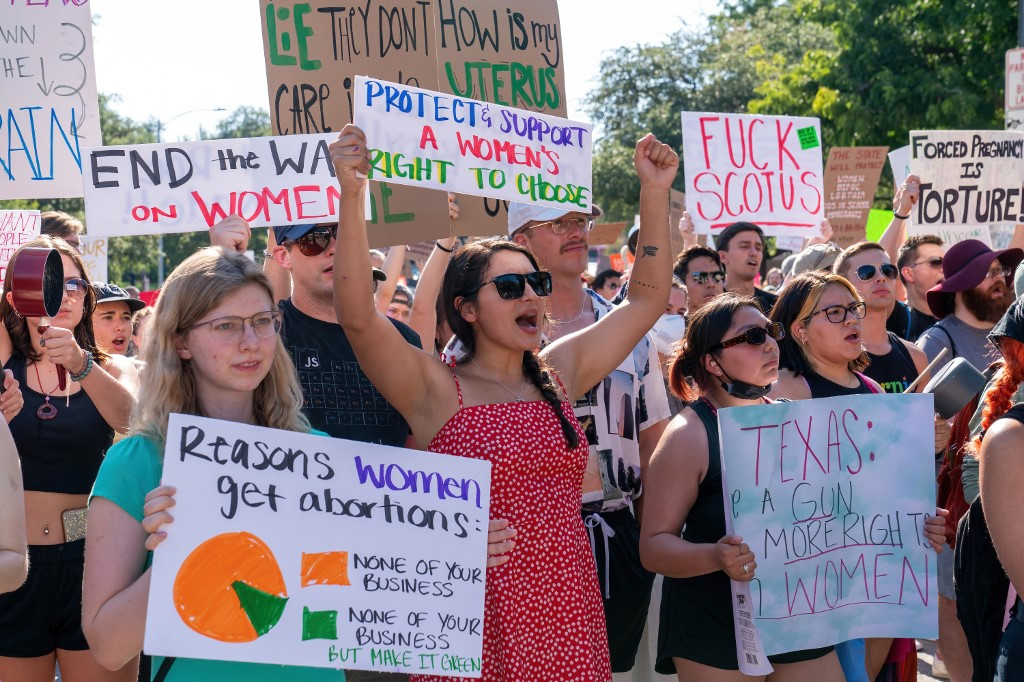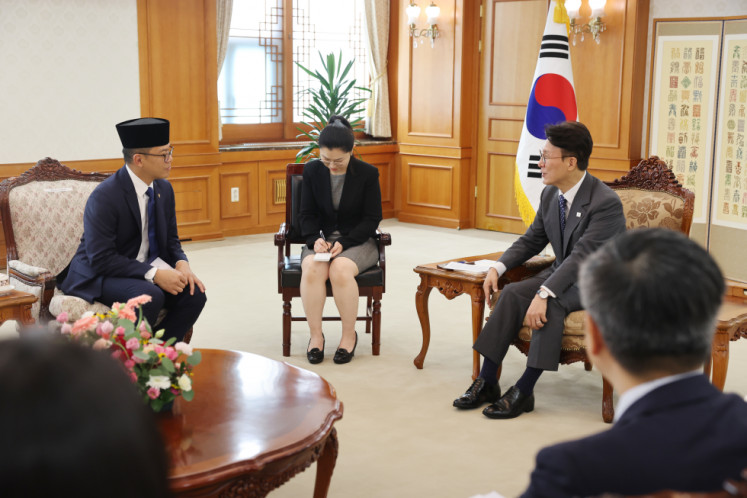Popular Reads
Top Results
Can't find what you're looking for?
View all search resultsPopular Reads
Top Results
Can't find what you're looking for?
View all search resultsRoe v. Wade and Indonesia’s 2024 presidential election
The main source of polarization is identity politics – race and sexual politics – the main target of which are women and minorities, both religious and sexual.
Change text size
Gift Premium Articles
to Anyone
What does abortion have to do with democracy? Or even logic? Much more than one would imagine.
The following was comic Chelsea Handler’s take on the issue when she was acting as a guest host for the Jimmy Kimmel Live show on June 28.
She started out with a video clip showing posters made by women at a demonstration:
“You [Republicans] didn’t like wearing a mask. Imagine being forced to have a baby.”
“Pregnancy begins with a penis. Regulate that!”
“Don’t like abortions? Ignore them, like you ignore school shootings.”
Chelsea, formerly a Democrat, now independent, continued her monologue, saying that the decision had divided families – those who supported women’s rights and those who did not – as well as the nation.
A civil war over abortion? Indeed, that could be the case. Both James Traub in Politico (May 19, 2022) and Stephen Marche in The Guardian (June 16, 2022) pointed out that the United States was in a stark era of division and could be approaching civil strife, with Marche noting that the overturning of Roe v. Wade had provoked “a legitimacy crisis no matter what your politics”.
This is precisely what the demonstrations were about. Roe v. Wade was the landmark 1973 Supreme Court decision that affirmed almost 50 years of the constitutional right to abortion. Five justices defied Pew Research and Gallup polls that showed that the majority of Americans supported abortion between 61 and 80 percent. No wonder there’s a legitimacy crisis if five people can decide the fate of the majority.
I have always wondered how Republicans could be so fervently anti-abortion – calling it “pro-life” – and at the same time passionately defend gun rights when so many school shootings have resulted from the lack of gun control. In 2022 alone, 27 school shootings have taken place and 250 mass shootings overall.
Where is the logic in this?
The point is, it’s not about logic or reality. It’s about politics. Since the US Supreme Court’s Roe v. Wade decision legalized abortion in 1973, the issue has become one of the defining fault lines in US politics, with Democratic politicians firmly supporting abortion rights and Republican lawmakers lining up in opposition.
The impact of the overturning of Roe v. Wade is so serious that Umair Haque, a prominent political thinker and popular media figure, wrote a column titled “The End of Roe Is a Bullet to the Heart of American Democracy”, with the subtitle “This Is Just the Beginning of the Theocratic Fascist State They Wanted All Along” (Medium Digest, June 26, 2022).
For a while now, I have seen parallels between the US and Indonesia, and Umair’s column affirms this, as since before Indonesian independence in 1945, political Islam has been fighting to make Indonesia a caliphate.
In Indonesia, the issues we face are a very long list, from environmental degradation, systemic corruption to human and civil rights violations.
But I would say the main source of polarization would be identity politics – race and sexual politics – the main target of which are women and minorities, both religious and sexual. Yet the civil tensions in Indonesia are occurring at a slow-but-sure pace between the Islamists and those who want to hold on to Indonesia’s democratic principles.
The equivalent hot button issue in Indonesia is regarding marriage between couples of different religions. Article 28E of the 1945 Constitution, guarantees freedom of religion, which obviously should include who one marries. So just like the American Supreme Court, by banning interreligious marriages, the Indonesian Constitutional Court, is going against the Constitution.
With the 2024 presidential elections coming up, the political atmosphere is heating up. Various campaigns are conducted to crank up party and political leaders’ popularity and to create mutually beneficial coalitions – for the politicians, not necessarily for the people.
For this reason, the Media and Democracy Center of the Institute for Research, Education and Publications on Economic and Social Affairs (LP3ES) held a Democracy School event in Leiden from June 23 to 25, in collaboration with the Royal Netherlands Institute of Southeast Asian and Caribbean Studies (KITLV) of Leiden University, Diponegoro University (Undip) in Semarang and the Indonesian Student Association (PPI), an organization for Indonesian students studying abroad.
The Democracy School is the baby of Wijayanto, director of the LP3ES Media and Democracy Center, who received his PhD from Leiden University.
In a press release, he said, “It is no exaggeration to say that the 2024 general election is a gamble for the sustainability of democracy, as the ongoing trend of democratic decline has led to a backlash toward authoritarianism”.
It’s true, political actors will fight tooth and nail to get into top positions of power, by hook or by crook – money politics, identity politics, coalitions of political expediency, getting their wives to wear hijabs to display their Islamic credentials, etc. Major eye-roll! Who are they fooling?
The Democracy School did cover many important issues, although as a senior fellow political commentator who also observed the proceedings said, they did not put anything new on the table.
And they left out one very important issue: gender. They did slap on a talk by a Dutch gender expert on gender and development, as a piecemeal way to insert gender into the program, without integrating it into the overall discussions of the Democracy School itself.
This is one thing that male political academics are resistant to get into their heads, that women’s issues are an integral part of the democratization process. Sukarno (1901-1970), our founding father and first president, already knew this way back before we became independent in 1945. In fact he said that women’s participation in the revolution was a prerequisite for gaining independence.
If you look at countries that have a high democracy index, they also have a high gender equality index. Countries like Iceland, Finland, Norway, New Zealand and Sweden, who have the highest gender equality indexes – first to fifth – according to the World Population Review, are also the top democracies in the world.
The reverse is also true. Indonesia is way down at 68.80 percent, with a democracy ranking of 77. It is also considered a deficient democracy, just like the US – surprise, surprise.
Indonesia is also a country which is recreating the colonial state in which there are first, second- and third-class: white Europeans, foreign Asiatics and natives.
This racial divide is a forerunner of the current constitutional division between 1) Sunni Muslims; 2) Indonesians of different religions/faiths and beliefs recognized as kosher under the Pancasila state doctrine and (3) the deviant sects like the Shia, Ahmadis etc.
Frankly, there is no future for a country which makes these sorts of divisive legislation which only leads to disintegration. What Indonesia needs is integrity not religious formalism and spiritual hypocrisy.
With the overturning of Roe v. Wade, America is waging a war on its women, which will result in the decline, possibly the death, of democracy in the so-called land of the free.
Indonesia should take heed, also all you male academics out there, that this also could well be the case in this country. The targeting or neglect of women’s rights is the first indicator of the overturning of democracy into authoritarianism.
***
The writer is the author of Sex, Power and Nation.










